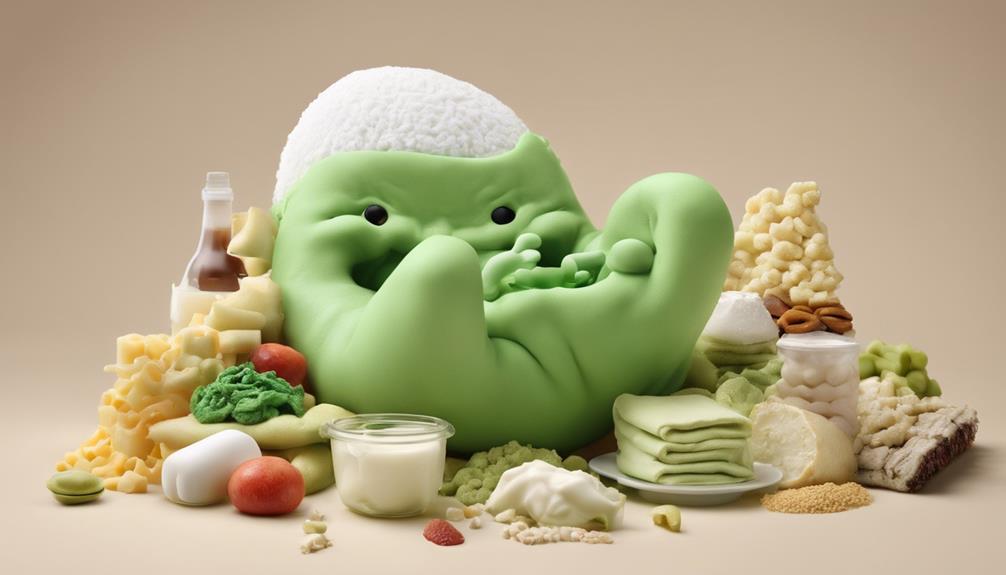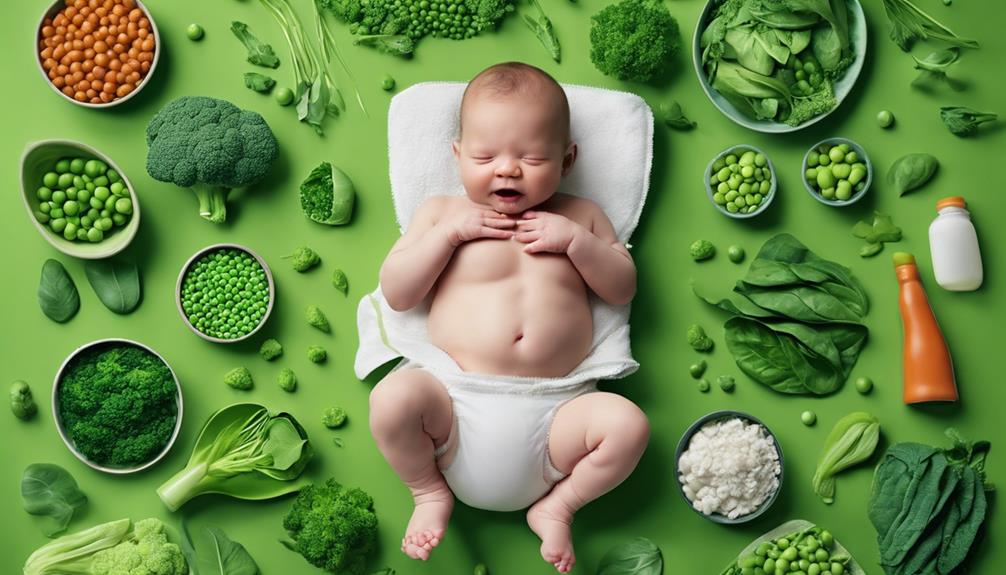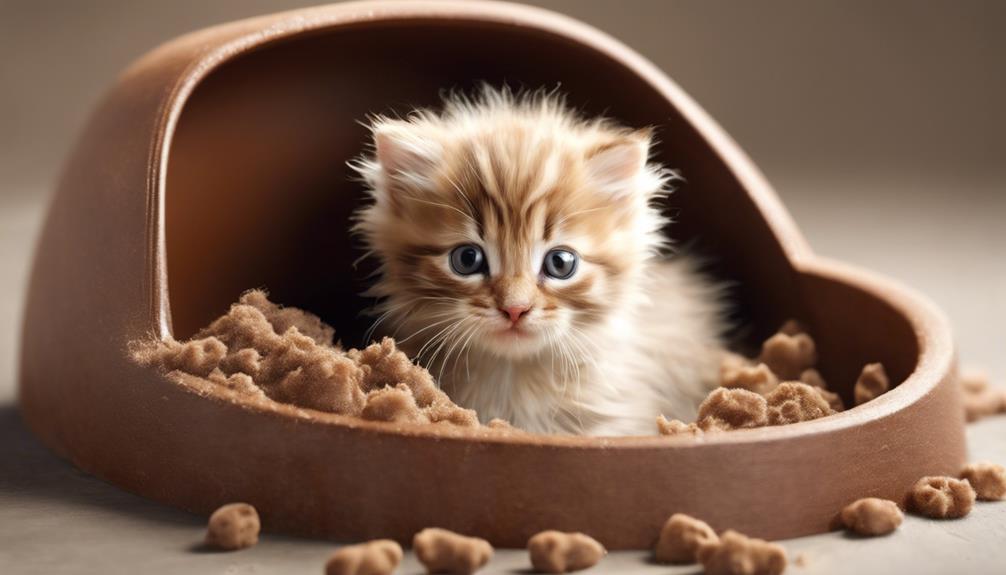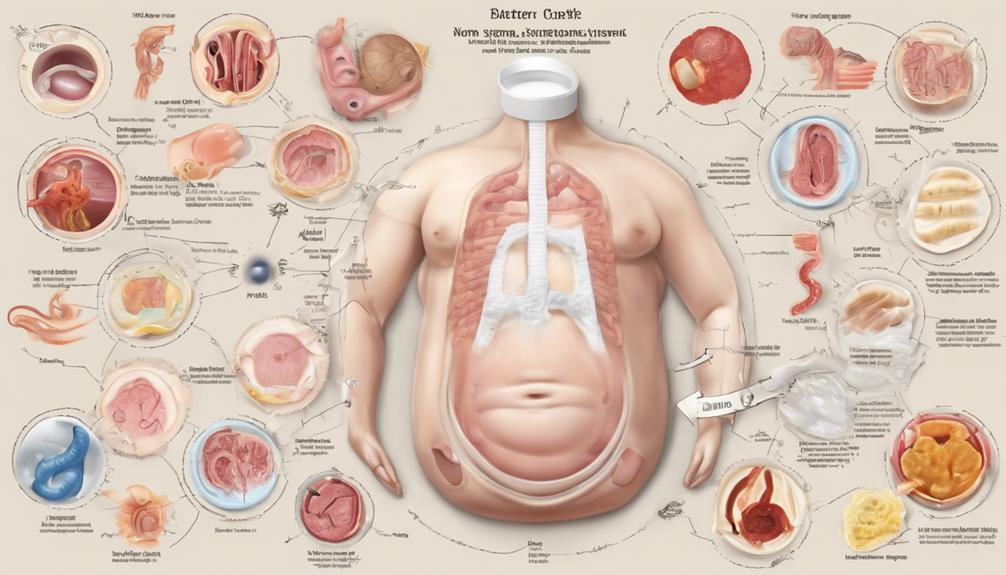As new parents, we were puzzled when our little one's diaper revealed a surprising shade of green, prompting us to question, 'Why is my newborn's poop green?'
The change of your baby's stool can be a source of concern or curiosity, signaling various underlying factors that warrant attention.
From the shift of meconium to typical bowel movements to dietary influences and potential health issues, exploring the reasons behind green poop can provide valuable insights into your baby's well-being.
Let's uncover the possible explanations together, shedding light on this common yet intriguing aspect of newborn care.
Key Takeaways
- Green baby poop can stem from meconium, excess bile, foremilk-hindmilk imbalance, infections, or dietary changes.
- Mucus or stool consistency changes along with green color may indicate digestive issues.
- Balancing foremilk and hindmilk through proper breastfeeding techniques is crucial.
- Consult healthcare providers to identify illnesses, food intolerances, and ensure proper management.
Defining Green Baby Poop
Exploring the various shades of green in baby poop provides valuable insights into the infant's health and well-being. Green baby poop is a common occurrence in newborns and infants and can vary in color from light to dark hues. Several factors contribute to this phenomenon, such as meconium change, excess bile, foremilk-hindmilk imbalance, infections, and dietary changes.
When a breastfed baby's poop appears green, it could signal an imbalance between foremilk and hindmilk intake. This imbalance affects the composition of the stool, resulting in a different color. Additionally, infections or dietary changes in the mother can also influence the color of the baby's poop. The presence of mucus or changes in stool consistency along with the green color may indicate an upset stomach or digestive issue that requires attention.
Understanding the reasons behind green baby poop is important for ensuring the baby's health and well-being. By monitoring these factors closely, caregivers can address any potential issues promptly and provide the necessary care for their little one.
Meconium and Excess Bile
Meconium, the initial stool passed by newborns, typically displays a dark green color due to the presence of amniotic fluid, mucus, and other residues from the womb. As the baby's digestive system matures, this meconium shifts to more typical yellowish-brown stools.
However, green poop in newborns can also be attributed to excess bile in the digestive tract, giving the stool a greenish tint. It's important to understand that the green color in a newborn's stool is a normal variation as their system adapts.
While green poop is generally considered normal, paying attention to any accompanying symptoms that might indicate an issue is crucial. By being aware of the shift from meconium to regular stools, parents can better grasp the nuances of their newborn's bowel movements and distinguish between expected variations and potential concerns.
Foremilk-Hindmilk Imbalance
In addressing a foremilk-hindmilk imbalance, it's essential for caregivers to understand the impact of breast milk composition on a newborn's stool color and consistency.
When you see those green, frothy stools, it can be concerning, but knowing it could be due to an imbalance brings clarity and reassurance.
Balancing foremilk and hindmilk through proper breastfeeding techniques like allowing complete emptying of one breast before switching sides can make a significant difference.
Seeking guidance from a lactation consultant or healthcare provider is a proactive step towards resolving these imbalance issues effectively.
Remember, addressing the foremilk-hindmilk imbalance not only helps regulate stool color but also promotes the overall well-being of your breastfed infant.
Understanding the nuances of breast milk composition and how it influences your baby's digestion is a critical aspect of ensuring their health and comfort. With the right support and knowledge, you can navigate and overcome foremilk-hindmilk imbalances for a smoother breastfeeding journey.
Illness and Food Intolerance

During the early months of life, caregivers may notice a change in their newborn's stool color, which could be attributed to illness or food intolerance. Illnesses like a stomach bug or viral infection can lead to green poop in newborns, while food intolerances, such as sensitivity to certain proteins, can also cause green stools. If your baby's green poop is accompanied by symptoms like bloating, gas, or irritability, it may indicate a food intolerance.
Both illness and food intolerances can result in diarrhea, leading to green, watery stools in newborns. Identifying the underlying cause of the green poop is important for proper management and treatment. If you suspect that your baby's green poop is due to an illness or food intolerance, it's important to consult with a healthcare provider to determine the best course of action for your little one's health and well-being.
Treatment and When to Seek Help
When addressing green baby poop, it's essential to take into account treatment options and know when to seek medical assistance. Treatment for green baby poop is typically unnecessary, but there are situations that may warrant medical attention. Here are some important points to consider:
- Monitor Symptoms: Keep an eye out for any signs of discomfort, illness, or unusual symptoms accompanying the green poop.
- Watch for Dehydration: If green poop is persistent and raises concerns about dehydration, it's important to seek medical help promptly.
- Look for Red Flags: Pay attention to severe symptoms, weight loss, changes in behavior, or signs of dehydration, as these may indicate a more serious issue.
- Immediate Medical Attention: If the poop is white or chalky gray, or if there are unusual colors like red or black, seek immediate medical attention as these could signal a potentially serious problem.
Frequently Asked Questions
When Should I Be Concerned About My Baby's Green Poop?
If your baby's poop is consistently green and you notice other symptoms like fever, vomiting, or diarrhea, it's important to contact a healthcare provider. Prompt attention is essential when unusual colors or behaviors present.
How Do I Stop My Newborn From Pooping Green?
Let's focus on soothing your newborn's tummy. Try adjusting feeding patterns, ensuring proper burping, and gentle belly massages. If issues persist or other concerns arise, consulting your healthcare provider is important for personalized advice.
Can Formula Cause Green Poop?
Yes, formula can cause green poop in babies due to added iron or consuming green foods. Checking formula iron content or discussing diet with a healthcare provider is wise for consistent green stools. Proper nutrition is key.
Can Breastmilk Cause Green Poop?
Yes, breastmilk can cause green poop in newborns. Factors like foremilk-hindmilk imbalance, maternal diet rich in green foods, and rapid milk transit can contribute. Monitoring and adjusting the lactating parent's diet may help regulate poop color.
Conclusion
In summary, understanding the reasons behind your newborn's green poop can be a perplexing puzzle. From meconium to diet to potential illnesses, there are various factors to ponder. Remember to monitor hydration, diet, and overall well-being.
Seeking medical advice for unusual colors or symptoms is essential. Let's navigate this newborn journey with patience and persistence, peeling back the layers of green poop mysteries with care and consideration.










